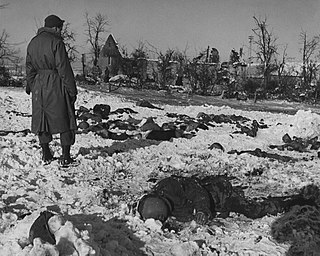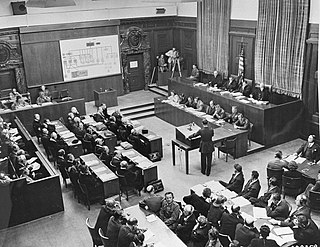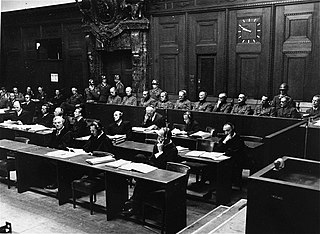
Reassessing the Nuremberg Military Tribunals. Transitional Justice, Trial Narratives, and Historiography is a book published in 2012 by Berghahn Books; it was edited by Kim Priemel and Alexa Stiller. [1] [2] [3] [4] [5] [6]

Reassessing the Nuremberg Military Tribunals. Transitional Justice, Trial Narratives, and Historiography is a book published in 2012 by Berghahn Books; it was edited by Kim Priemel and Alexa Stiller. [1] [2] [3] [4] [5] [6]

The Nuremberg trials were held by the Allies against representatives of the defeated Nazi Germany, for plotting and carrying out invasions of other countries, and other crimes, in World War II.

A war crime is a violation of the laws of war that gives rise to individual criminal responsibility for actions by combatants in action, such as intentionally killing civilians or intentionally killing prisoners of war, torture, taking hostages, unnecessarily destroying civilian property, deception by perfidy, wartime sexual violence, pillaging, and for any individual that is part of the command structure who orders any attempt to committing mass killings including genocide or ethnic cleansing, the granting of no quarter despite surrender, the conscription of children in the military and flouting the legal distinctions of proportionality and military necessity.
Universal jurisdiction is a legal principle that allows states or international organizations to claim criminal jurisdiction over an accused person regardless of where the alleged crime was committed, and regardless of the accused's nationality, country of residence, or any other relation to the prosecuting entity. Crimes prosecuted under universal jurisdiction are considered crimes against all, too serious to tolerate jurisdictional arbitrage.

The Doctors' Trial was the first of 12 trials for war crimes of high-ranking German officials and industrialists that the United States authorities held in their occupation zone in Nuremberg, Germany, after the end of World War II. These trials were held before US military courts, not before the International Military Tribunal, but took place in the same rooms at the Palace of Justice. The trials are collectively known as the "subsequent Nuremberg trials", formally the "Trials of War Criminals before the Nuremberg Military Tribunals" (NMT).

The subsequent Nuremberg trials were a series of 12 military tribunals for war crimes against members of the leadership of Nazi Germany between December 1946 and April 1949. They followed the first and best-known Nuremberg trial before the International Military Tribunal which concluded in October 1946. In contrast, the subsequent trials were conducted before U.S. military courts rather than an international court. They are also collectively known as the Nuremberg Military Tribunals.

The United States of America vs. Carl Krauch, et al., also known as the IG Farben Trial, was the sixth of the twelve trials for war crimes the U.S. authorities held in their occupation zone in Germany (Nuremberg) after the end of World War II. IG Farben was the private German chemicals company allied with the Nazis that manufactured the Zyklon B gas used to commit genocide against millions of European Jews in the Holocaust.

The Hostages Trial was held from 8 July 1947 until 19 February 1948 and was the seventh of the twelve trials for war crimes that United States authorities held in their occupation zone in Germany in Nuremberg after the end of World War II. These twelve trials were all held before US military courts, not before the International Military Tribunal, but took place in the same rooms at the Palace of Justice. The twelve US trials are collectively known as the "Subsequent Nuremberg Trials" or, more formally, as the "Trials of War Criminals before the Nuremberg Military Tribunals" (NMT).

The High Command Trial, also known initially as Case No. 12, and later as Case No. 72, was the last of the twelve trials for war crimes the U.S. authorities held in their occupation zone of Germany in Nuremberg after the end of World War II. These twelve trials were all held before U.S. military courts, not before the International Military Tribunal, but took place in the same rooms at the Palace of Justice. The twelve U.S. trials are collectively known as the "subsequent Nuremberg trials" or, more formally, as the "Trials of War Criminals before the Nuremberg Military Tribunals" (NMT).

International criminal law (ICL) is a body of public international law designed to prohibit certain categories of conduct commonly viewed as serious atrocities and to make perpetrators of such conduct criminally accountable for their perpetration. The core crimes under international law are genocide, war crimes, crimes against humanity, and the crime of aggression.

Benjamin Berell Ferencz is an American lawyer. He was an investigator of Nazi war crimes after World War II and the chief prosecutor for the United States Army at the Einsatzgruppen Trial, one of the 12 Subsequent Nuremberg Trials held by the U.S. authorities at Nuremberg, Germany. Later, he became an advocate of international rule of law and for the establishment of an International Criminal Court. From 1985 to 1996, he was adjunct professor of international law at Pace University.
Racism in Poland in the 20th and 21st centuries has been the subject of significant inquiry. While ethnic minorities made up a more significant proportion of the country's population from the founding of the Polish state through the Second Polish Republic, 21st century government statistics have shown 94% or more of the population self-reports as ethnically Polish.
Robert Levy or Robert Lévy was a French Jewish physician who served with the German army in World War I, for two years. During World War II, he served as the prisoner-doctor at Auschwitz.

Hitler's Generals on Trial: The Last War Crimes Tribunal at Nuremberg is a 2010 book by Canadian historian Valerie Hébert dealing with the High Command Trial of 1947–1948. The book covers the criminal case against the defendants, all high-ranking officers of the armed forces of Nazi Germany, as well as the wider societal and historical implications of the trial. The book received generally positive reviews for its mastery of the subject and thorough assessment of the legacy of the trial.
Michael Bazyler is an American professor of law and 1939 Society Law Scholar in Holocaust and Human Rights Studies at Chapman University. He previously taught at Whittier Law School. His book Holocaust Justice: The Battle for Restitution in America’s Courts was cited by the United States Supreme Court while Holocaust, Genocide, and the Law was a 2016 Jewish Book Council winner.
At the conclusion of the Obersalzberg Speech (1939), German dictator Adolf Hitler likely stated, "Who, after all, speaks today of the annihilation of the Armenians?" The veracity of the quote has been debated by scholars.

Forced labor was an important and ubiquitous aspect of the Nazi concentration camps which operated in Nazi Germany and German-occupied Europe between 1933 and 1945. It was the harshest and most inhumane part of a larger system of forced labor in Nazi Germany.

Private sector participation in Nazi crimes was extensive and included widespread use of forced labor in Nazi Germany and German-occupied Europe, confiscation of property from Jews and other victims by banks and insurance companies, and the transportation of people to Nazi concentration camps and extermination camps by rail. After the war, companies sought to downplay their participation in crimes and claimed that they were also victims of Nazi totalitarianism. However, the role of the private sector in Nazi Germany has been described as an example of state-corporate crime.
Kim Christian Priemel is a historian of Germany and former professor at Humboldt University Berlin; he now works for the University of Oslo.
Richard Friedrich Wetzell is an American historian specializing in German criminology and research fellow at the German Historical Institute.
Kevin Jon Heller is a scholar of international law, who is a professor of law at the Australian National University and has also taught at the University of Amsterdam, SOAS, University of London, and Melbourne Law School. Heller was described by one reviewer as "an accomplished scholar, multi-published writer, and heralded blogger on the most current and controversial topics in international law".